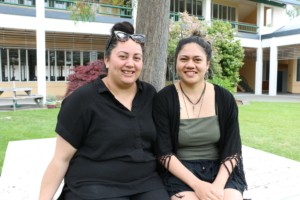
Serene (l) and Te Wairakau (r) are committed to making a difference for Māori health.
Serene Morrell and cousin Te Wairakau Morrell-Vercoe are about to wrap-up an exciting first year of studying for a nursing degree at EIT with their last exams just around the corner.
Serene is of Ngāti Kahungunu, Ngāti Porou and Ngai Tahu descent and a mum-of-four children, 12, 10, 7 and 5 years old. There are different reasons why the 33-year-old decided to take the plunge and go back “to school”. For her it’s not only about advocating for cultural awareness in the health sector, but also supporting her own family – especially seven-year-old son Jai who was born with Marfan syndrome, a rare genetic disorder, and other whānau members who suffer from health issues.
Of Ngai Tuhoe, Ngāti Kahungunu, Ngāti Porou and Ngai Tahu descent, Te Wairakau spent two gap years working in retail and in a pack house before she committed herself to study. “I always liked learning and I wanted to become a nurse to better the wellbeing of our people, and educate my whānau“.
Both women first completed a Level 4 Certificate in Study and Career Preparation at EIT and then enrolled in the Bachelor of Nursing degree. They were awarded the Rapai Pohe Scholarship which took the financial burden of studying for a degree off their shoulders. On campus they clicked with a group of other students, most of them are young mothers. Their friendship and the support of their lecturers has carried them through their first year.
Both learned a lot on their placement in Hawke’s Bay Regional Hospital. With family members being treated there before, they could relate to the patients even better. They were also able to participate in the Indigenous Nurses Conference in Auckland. This is a four-day event focusing on Māori health and inequalities within the health system. There Serene was one of five recipients of the Pharmac Tapuhi Kaitiaki Award in the category of Māori Nurse Mātauranga in Aotearoa.
“This conference exposed me to a realistic outlook on health disparities of our people”, says Te Wairakau. “What we need in New Zealand are more Māori medical professionals. For patients it’s not only about receiving a diagnosis and medication. It’s about trust and building a connection and a relationship.”
“When seeing a patient especially Māori, making connections through the sharing of whakapapa is vital to me. It’s so important to be able to relate to one another and to make our people feel safe and comfortable,” says Serene.
“There is so much positivity to be learned from our indigenous culture and knowledge. Western and indigenous science, medicine and nutrition are complementing each other, and we should make the most out of it,” says Serene.
There is always new research being done or new trends people follow, yet some new trends are not so new. “Indigenous cultures for instance have been eating ‘keto’ and ‘vegan’ over hundreds of years harvesting their own kai, consisting of traditional vegetables, kaimoana and fermented food or using native herbs as natural remedies (rongoā).”
“There is a place for both westernized and traditional methods in Aotearoa relating to health and wellbeing. We as a country and in the health sector have to be strong enough and willing to accept and acknowledge this and it is great to see this is starting to happen as part of cultural awareness.”
Although Te Wairakau and Serene have only started their study, their plans for the future are quite clear. “The majority of illnesses like diseases related to obesity can be prevented. But often it’s just that lack of awareness and education that we have to tackle. To be able to work within a Māori provider or in public health will enable us to work closely with our people and help to prevent hospitalisation.”

